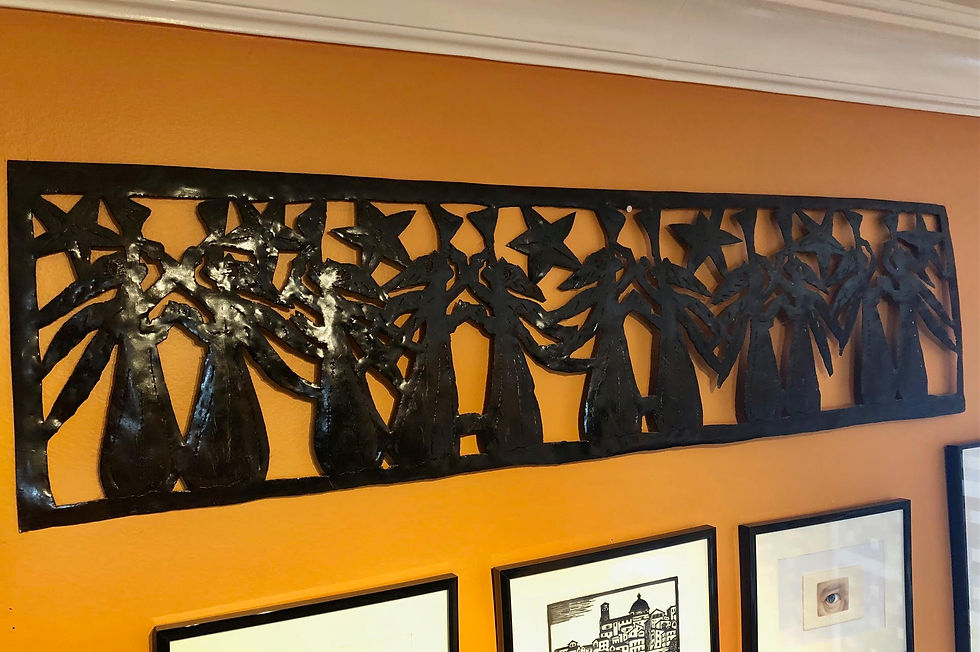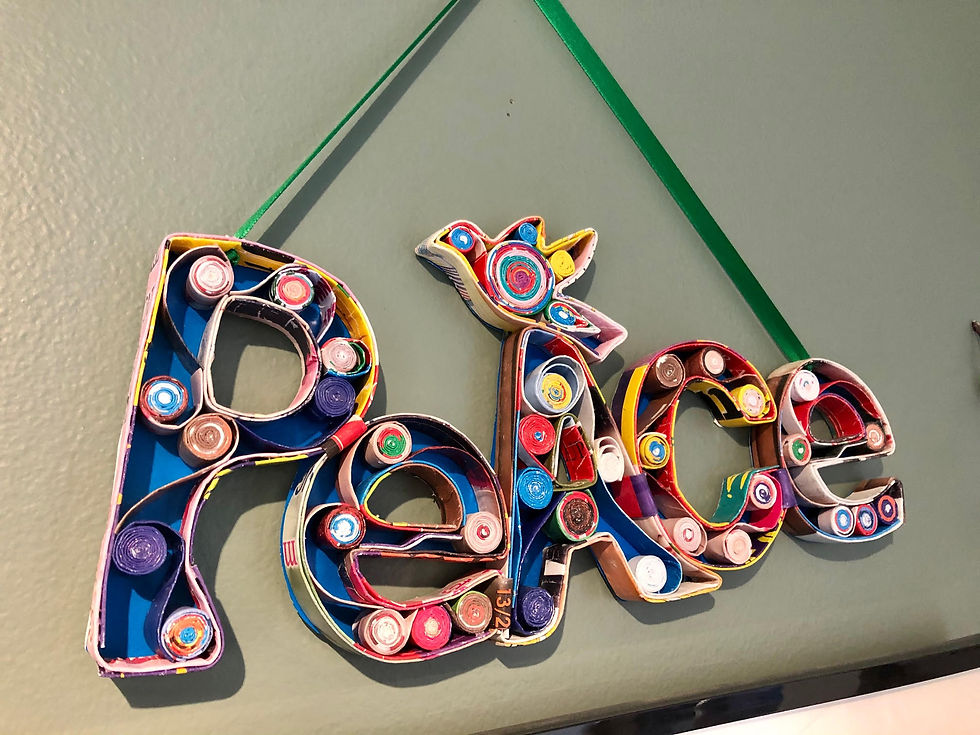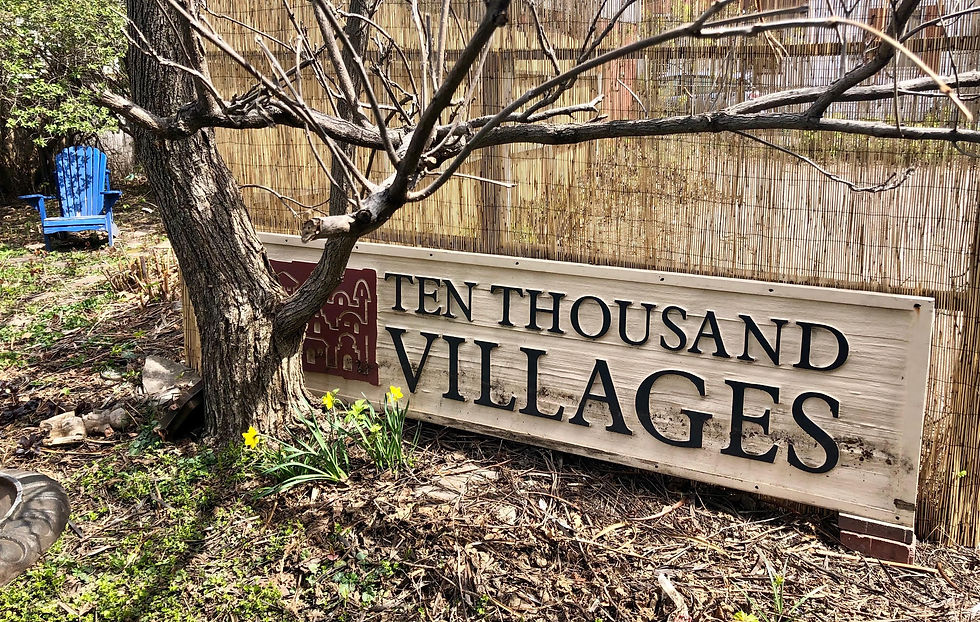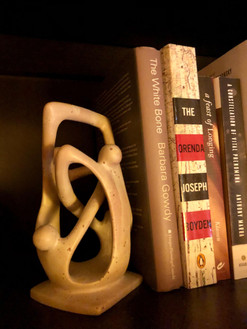Artisans' Gifts
- carlamklassen
- May 1, 2021
- 8 min read
There was a place of boundless care that filled many of my hours, for many years. It was a place that brought hope to thousands. It brought joy and beauty and love. It connected people who would never have otherwise been connected. It offered jobs for those who desperately needed employment. It allowed dignity to emerge and flourish. It supported the astounding talents of artisans all over the world. It provided space for the generosity of people who wished to volunteer their time and energy to a worthy endeavour.
I am of Mennonite heritage. When we first moved to Ottawa, I will admit I wasn’t much interested in churchy things, and our commitment to attending was slim, at best. A number of years after we moved here, we heard about a Ten Thousand Villages Sale at the Ottawa Mennonite Church. We knew about this organization – one that sold fairly traded goods from developing countries in order to provide much needed income and jobs. We also knew that we were sure to like, and want, some of these items, so we went – wallets in hand. I don’t remember if we bought anything that day, but I do remember walking into that church building and smelling borscht. It was like a sentimental kick in the gut. We both felt it and were instantly transported into each of our Oma’s kitchens. We didn’t immediately return to regular church attendance (that came after attending a Fine Arts Night at the same place – borscht and music? Sold.), but we were drawn into the world of Ten Thousand Villages. And it would change my life in countless ways.

In 1999 we were involved in the establishment of a Ten Thousand Villages store in Ottawa. After many, many years of seasonal sales at the church, it was decided that a permanent home was warranted and a shop was opened in the Westboro neighbourhood. We worked hard. Opening a retail store on a non-profit budget requires elbow grease – and we contributed just that with energy that I can barely remember having access to. We worked with a small group of volunteers to plan a business and renovate a space. It was a memorable experience. I decided to continue volunteering in the store once it had opened, and shortly thereafter became part of the management team. It was largely accidental that this happened, a need was there and I seemed to be able to fill it – something I continued doing for fifteen years. My time with this special organization opened my eyes to people’s lives. Here and elsewhere. People I would not have seen otherwise. I am grateful for the view, the learning, the laughs, the tears. And, I am grateful for a whole lot of stuff.
I had a quick wander through the house and counted well over a hundred things purchased, or received as gifts, from Ten Thousand Villages. I didn’t even delve too deeply into cupboards, or dig through cloth napkins and tablecloths, or open up the box of Christmas ornaments. These little treasures are everywhere. In corners, on shelves, hanging on walls, out on the porch. They fill our home with memories and with glimpses of the cultures and crafts of others. And, there are some stories. I can’t possibly speak to every item, that would get a bit tedious, but there are a few that hold within them the humour, the experiences, the people and the lessons learned.
One of the first things I remember buying from Ten Thousand Villages was a cut metal wall hanging. It was a very popular item that year, and sold out quickly. This was before the store opened and I had to wait a couple of weeks to get my hands on one. I loved the shape of these trumpeting angels – a row of joyful song. When I learned the story behind this craft, I loved it even more. The metal comes from old oil drums. Oil drums. Let that sink in. A discarded vessel used to transport something we all use, something that doesn’t exactly have the best reputation for its impact on our environment. I imagine these oil drums are ubiquitous and fill all sorts of space when they are no longer being used. In Haiti, where these are made, artisans masterfully transform this, well, garbage, into beauty. Refuse turns into something to exchange for income – for a livelihood. Taking the garbage of the world and allowing immense creativity to shine through. A lot of what we sold was like this, cut metal being but one example of revisioning humble materials into something valuable. I always found that inspiring. I continue to be reminded of both our wastefulness and our imagination when I look at our pieces of cut metal. They speak loudly.


My all-time favourite (sort of) store experience involved some gentlemen from Kenya. These tall, wood carvings had a bit of a rough ride on their way to Canada. Somewhere between Africa and here, they acquired some inhabitants…bugs that really weren’t welcome. An entire shipment of sculptures were detained upon arrival and had to be fumigated so as to avoid their buggy passengers from taking up residence and, well, spreading. This was all done according to whatever regulations existed, and these fellows eventually made it to the Ten Thousand Villages warehouse bug free, but with a few more holes than expected. They couldn’t be sold as regular products, but one of my co-managers at the time felt we could sell them as garden ornaments. Which is exactly what we did. Several groups of a half dozen of these six foot tall carvings stood outside the store welcoming customers for a few weeks that summer – each hoping to find a home. Now, one wouldn’t think bug damaged sculptures would be a hot ticket, but they were. I remember vividly the day two customers almost came to blows over the last three that were available. The words, “would you like to step outside” were actually uttered. Funny, but not. I had never seen anything quite like it. The rudeness, the selfishness, the disrespect. At some point it became clear that I would have to intervene, and upon asking the instigator to leave, the issue was resolved, or at least deflected out of the premises. People are so very strange. We have one of these gents in our sunroom – he is called The Ambassador. Because he is a traveller who has been on a tiring journey, but continues to speak to us about where he came from and who made him. He reminds me of greedy people who can’t see beyond their own interests. And yet he stands tall – a carved example of the ways in which the poorest among us can express their dignity, even when we are too greedy to see its value.

Many of the products we acquired during my tenure, are broken. Not broken as in, they had a mishap while in our possession, but broken as in, they arrived that way. Perhaps travel in a shipping container isn’t all it’s cracked up to be. I can’t count up the number of hours I spent unpacking things from all over the world. Endless boxes. Sometimes things were damaged. At first, it broke my heart each time I had to toss some shards away. Then, it became routine. But always my eye was on the lookout for things too busted to sell, but still good enough for my collection. I’m pretty good with a bottle of glue, so fixing things (or facing their bad side towards a corner) was never an issue. One of my favourites is a terra cotta table from Bangladesh that sits on our back porch. I’m not sure terra cotta is the best material for a table that needs to travel around the world, and the product was discontinued in fairly short order, but I love the one we have. And, surprisingly, it has withstood more than a decade of Canadian winters outside in the cold. It’s broken. But it’s still a thing of beauty. The hands that made it gave it beauty, reality gave it cracks, a little glue and care allowed it to withstand the weather. Sounds about right.

The people I was privileged to work with over the years, will always remain in my heart. There were volunteers of astounding generosity – giving many hours of their time to make this thing work. Then there were the staff. As a primarily volunteer organization, there weren’t many of us. But we relied on each other heavily. These people were like family members. In fact, running that store was very much like owning a small family business. It wasn’t so much about working certain hours, it was about making sure what needed to be done was done. It was about doing whatever we could to ensure we sold as much as possible, so our colleagues overseas could feed their children, go to school, and support their families and businesses. One of the things we have in our home is a lamp made of onyx from Pakistan. I never really planned to buy it. But after I had left my job there, my friend and former colleague Judy mentioned to me that it had been special ordered and then returned. She thought I would like it. And, I did. So here it is. I love how the light shines through the stone. A hard material that suddenly becomes softly lit – a contrast that makes me think of the stone carvers that made it, finding that smooth, lovely shape in a piece of solid rock. It also reminds me of the people I shared this task with over many years. It was, at times, hard. Very, very hard and very, very tiring. And yet, there was a soft light that never ceased to shine from the work we did, and the lives we were able to learn about and share as we carefully took their treasures and passed them on. This work made us friends. And friends we remain.

The act of serving others in an attempt to offer hope is, I think, an act of peacemaking. The work that Ten Thousand Villages did represents that to me. Lives were changed by this organization. Hundreds and thousands of lives. Lest it seem like this is a grand pat on the back, I should say that this peacemaking was definitely a two way street. Those artisans were serving us every bit as much as we them. They offered their skill, their stories, their love in every item I handled, and in every item we now have in our home. These talented people showed me how to rise above the challenges of life and look for beauty anyway. I live in the most privileged possible context – through no effort of my own, simply by an accident of birth. And I have never worked as hard or produced as much as what many of these beautiful souls have done. But what really impressed me, was one of the many experiences I had meeting one of the artisans. I will never forget this tiny woman who came to Canada to see where her products were being sold. As we gathered to meet her at the store, there was a moment when she quietly stopped the usual festivities of such a visit and prayed for us. It was a profound moment when it was clear to all, despite not speaking the same language or living even remotely similar lives, that she was as concerned for our well-being as we were for hers. It was a beautiful example of how our circumstances do not make us saviours, but require us to work as partners with whomever we find ourselves connected to. Our goal was to change their lives, but I know they changed ours just as much, perhaps more.

Ten Thousand Villages closed its doors in Canada in 2020. It is heartbreaking that this organization that has offered so much to so many is no longer part of our lives. It is an empty space that simply cannot be filled. I wish there was a happier ending to this chapter, but there isn’t. This organization started more than seventy-five years ago. How many lives were changed in that time? I know mine was. And I am thankful for the whole experience. I am thankful that I have a hundred, or more, reminders of the artisans that gave me their gifts. I see them. I know they are still there. I know they live their lives with the same fears and joys and needs and wisdom and intelligence and kindness and love that we do in our relative comfort here. I am eternally grateful to have made their acquaintance, if only indirectly. These artisans' gifts fill my home, and fill my heart.




































Comments